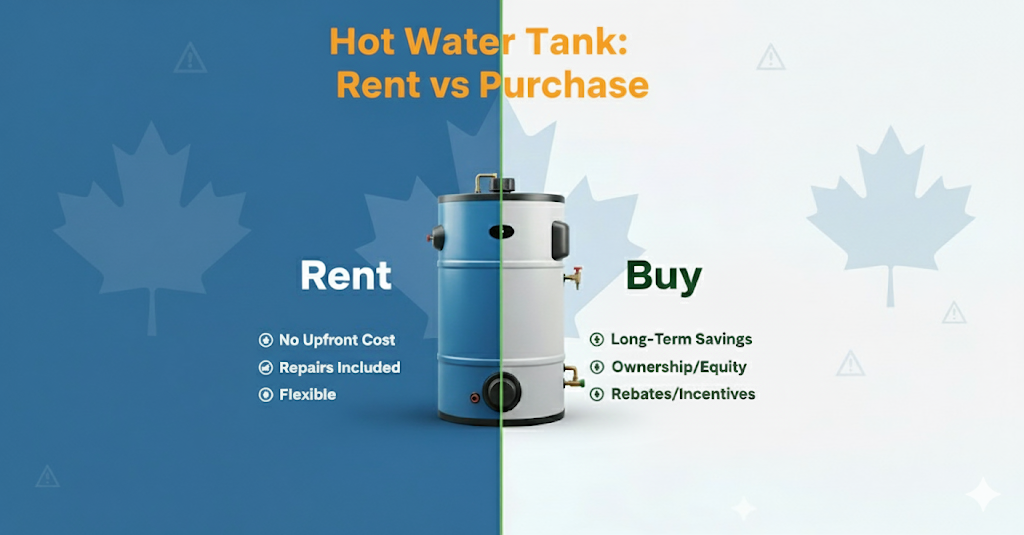When it comes to having reliable hot water at home, one of the biggest decisions Canadian homeowners face is hot water tank: rent vs purchase. For many households, a water heater is an essential appliance that runs quietly in the background but makes everyday life more comfortable—whether you’re showering, doing dishes, or running laundry.
The question is: should you rent a hot water tank, or should you buy it outright? The answer isn’t the same for everyone, because it depends on your budget, lifestyle, and long-term plans. In this guide, we’ll explore all aspects of this decision, breaking down costs, pros and cons, rebates, and factors to consider so you can make the best choice.
GM HEATING AND COOLING INC, a trusted HVAC company in Canada, has helped countless families navigate this decision, so you’re in the right place to learn from experts.
Hot water tank: rent vs purchase – What does it mean?
Before diving into the numbers, let’s define both options:
- Renting a hot water tank: You sign a contract with an HVAC or utility company to pay a monthly fee (usually $15–$55) for the water heater. The contract often includes installation, repairs, and maintenance.
- Purchasing a hot water tank: You pay upfront to buy the water heater and cover installation costs. After that, you own the unit and only pay for occasional repairs or maintenance.
Both approaches have their place in Canadian households, but they come with very different financial and practical implications.
Hot water tank: rent vs purchase – Cost comparison
One of the first things most people want to know is how the costs compare between renting and buying.
Renting a hot water tank
- Monthly fees: $15 to $55+ depending on the size, model, and type (gas, electric, or tankless).
- Installation: Often included in the rental agreement.
- Repairs & maintenance: Usually covered.
- Long-term cost: Over 10–15 years (average lifespan of a hot water tank), you may end up paying $1,800 to $9,900.
Purchasing a hot water tank
- Upfront cost: $500 to $2,000+ depending on size, type, and efficiency rating.
- Installation cost: $500–$1,000, sometimes more for advanced systems like tankless.
- Repairs & maintenance: Paid by the homeowner.
- Long-term cost: If the system lasts 10–15 years, total expenses are generally lower than renting.
💡 Key takeaway: Renting may seem cheaper month-to-month, but over the lifespan of a unit, buying almost always costs less.
Hot water tank: rent vs purchase – Pros of renting
Many Canadians still prefer renting, especially if they move frequently or don’t want upfront expenses. Here are the main advantages:
- Low upfront cost: Instead of paying $1,500+ at once, you only pay a small monthly fee.
- Repairs included: No surprise expenses if the unit breaks down.
- Installation included: Saves $500–$1,000 in initial costs.
- Flexibility: Easier for short-term living arrangements, such as rental properties or temporary housing.
Hot water tank: rent vs purchase – Cons of renting
The downsides of renting a hot water tank usually appear over time:
- Higher lifetime cost: If you stay in the same home for 10+ years, renting costs much more.
- Contract limitations: Rental agreements may have cancellation fees or restrictions.
- Limited models available: Rental programs often offer fewer choices compared to buying.
- Annual increases: Monthly rental fees can rise by 3–5% every year.
Hot water tank: rent vs purchase – Pros of purchasing
For long-term homeowners, buying a water heater often makes more sense. Here’s why:
- Lower overall cost: Even with installation and occasional repairs, buying usually saves money over time.
- Full ownership: You control the unit, without ongoing rental contracts.
- More choices: You can select from a wide variety of sizes, types, and high-efficiency models.
- Increased home value: Owning major appliances outright can be an advantage when selling your home.
Hot water tank: rent vs purchase – Cons of purchasing
Of course, purchasing comes with its own considerations:
- High upfront expense: Can cost $1,500–$3,000 including installation.
- Repair costs: You’ll need to budget for repairs and maintenance.
- Replacement cost: When the unit reaches the end of its lifespan, you’ll pay full price again.
- Responsibility: All upkeep falls on you, unlike rental programs that handle it.
Factors to consider when deciding on hot water tank: rent vs purchase
Here are the main factors Canadian homeowners should weigh before making the decision:
- How long you’ll stay in the home: If you plan to live there long-term, buying is usually better.
- Budget flexibility: Renting avoids upfront costs but adds long-term expenses.
- Maintenance preference: Renting covers repairs; buying requires responsibility.
- Energy efficiency goals: Purchasing allows you to choose more advanced, energy-saving models.
- Rebates & incentives: Federal and provincial energy programs sometimes offer rebates for purchasing energy-efficient models.
Government rebates and incentives in Canada
When considering hot water tank: rent vs purchase, don’t forget to check available rebates:
- Canada Greener Homes Grant: Offers up to $5,000 for energy-efficient upgrades, which can apply to certain high-efficiency water heaters.
- Provincial programs: Ontario, BC, and other provinces may offer additional incentives for replacing old water heaters with efficient models.
- Utility rebates: Local utility companies sometimes provide discounts for switching to energy-saving appliances.
These programs often make purchasing even more attractive. GM HEATING AND COOLING INC can help you identify rebates you may qualify for.
Hot water tank: rent vs purchase – Which is better for you?
The decision comes down to your situation:
- Choose renting if:
- You’re renting your home or moving within a few years.
- You prefer predictable monthly costs with no surprise repair bills.
- You don’t want to pay large upfront fees.
- Choose purchasing if:
- You plan to stay in your home long-term.
- You want to save money over the lifespan of the tank.
- You value full ownership and the ability to choose from more efficient models.
How GM HEATING AND COOLING INC can help
At GM HEATING AND COOLING INC, we understand the importance of reliable hot water in Canadian homes. Whether you’re interested in renting or purchasing, our experts can guide you through:
- Choosing the right size and model for your family.
- Explaining upfront and long-term costs clearly.
- Offering professional installation with quality workmanship.
- Helping you access rebates and incentives to save money.
- Providing maintenance and repair services to keep your system running efficiently.
Our team believes in transparency and long-term customer satisfaction. That’s why we help homeowners make informed decisions about hot water tank: rent vs purchase rather than pushing one option over the other.
Final thoughts
The choice between hot water tank: rent vs purchase ultimately depends on your budget, lifestyle, and long-term plans. Renting offers convenience and flexibility, while buying provides ownership and long-term savings.
If you’re still unsure, GM HEATING AND COOLING INC can assess your home’s needs and help you choose the most cost-effective option. Investing in the right water heating solution will not only improve your comfort but also save you money in the years ahead.
FAQs
1. Is it better to rent or buy a hot water tank in Canada?
Renting offers low upfront costs, while buying saves more long term.
2. How much does it cost to rent a hot water tank in Canada?
Rental fees range from $15–$55 per month, often including installation and repairs.
3. What is the average price to purchase a hot water tank in Canada?
Buying costs $500–$2,000 plus $500–$1,000 for installation.
4. Does renting a hot water tank include repairs and maintenance?
Yes, most rental contracts cover installation, repairs, and maintenance.
5. Are rebates available when purchasing a hot water tank in Canada?
Yes, federal, provincial, and utility rebates are available for efficient


